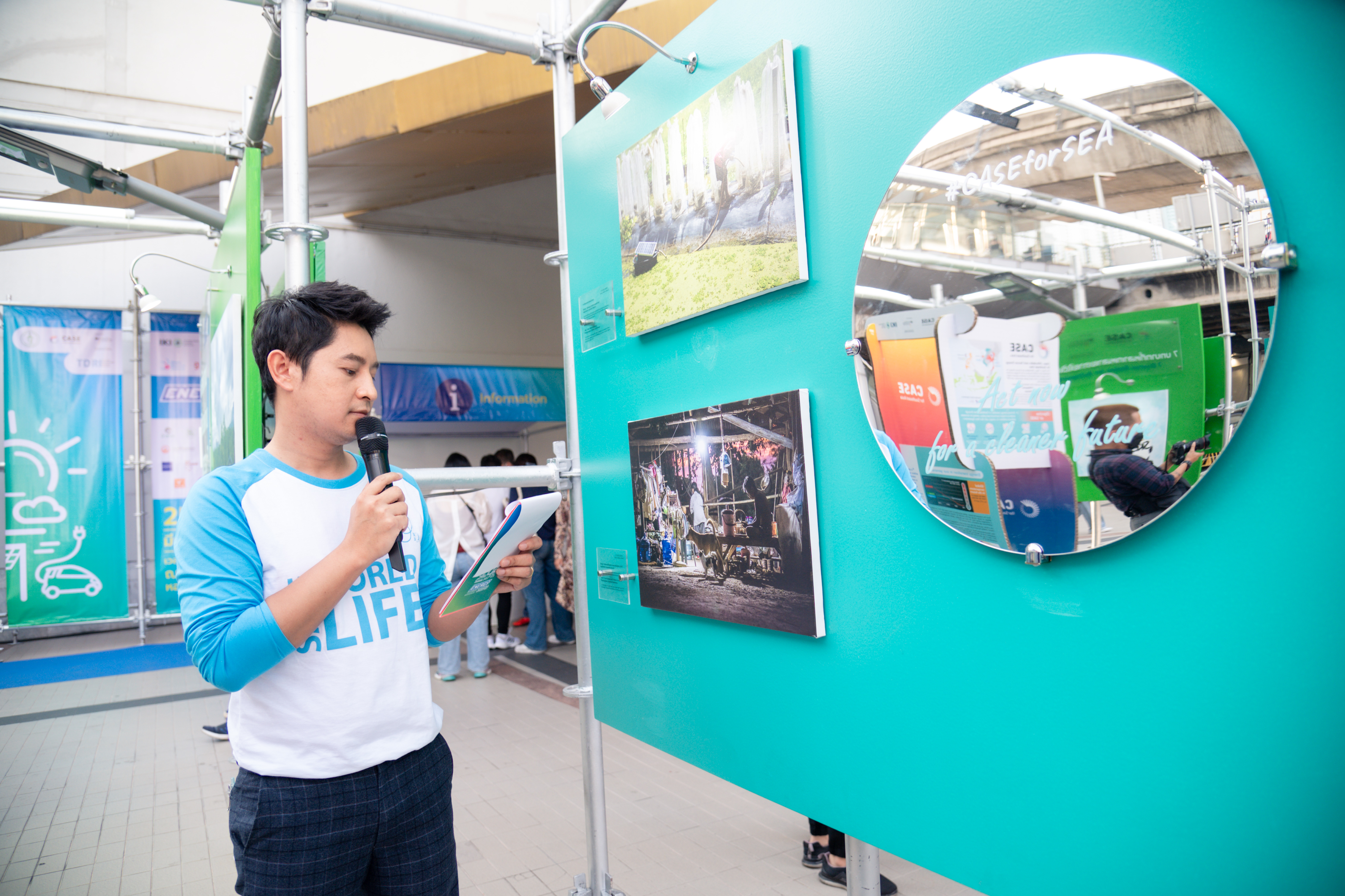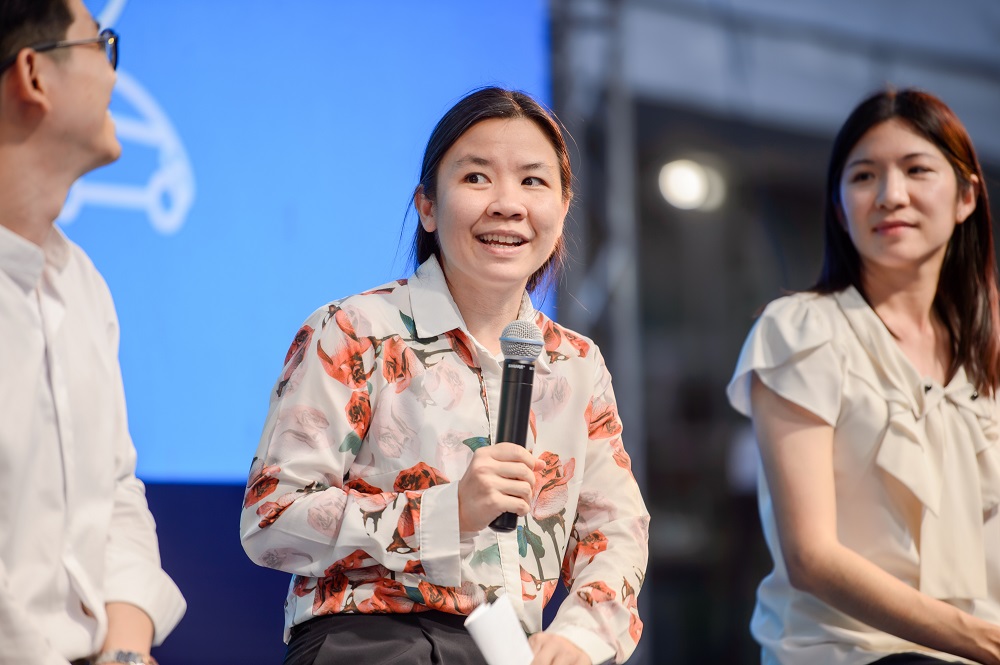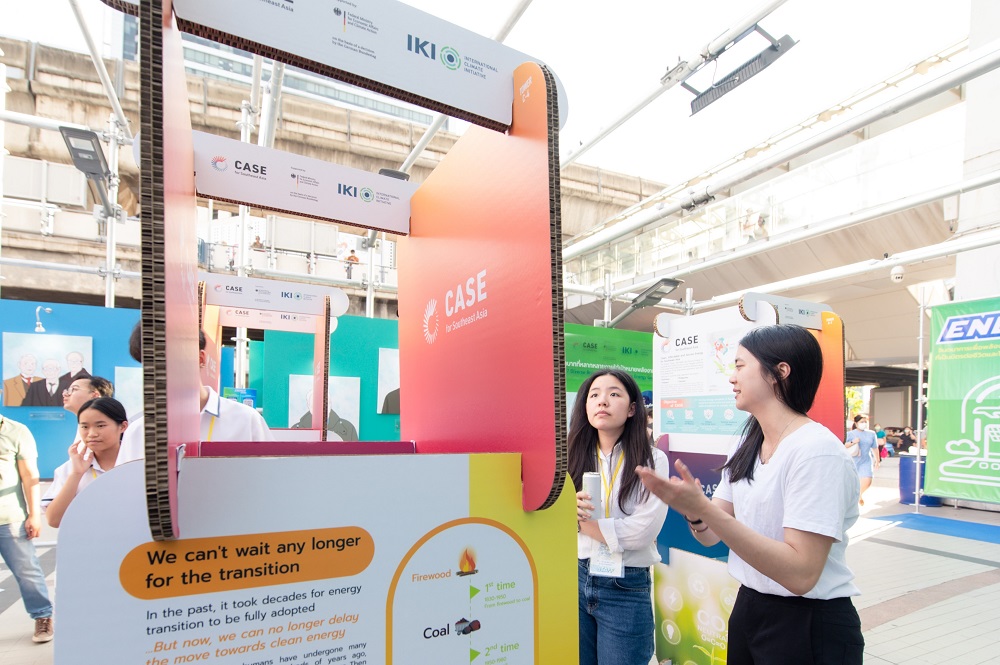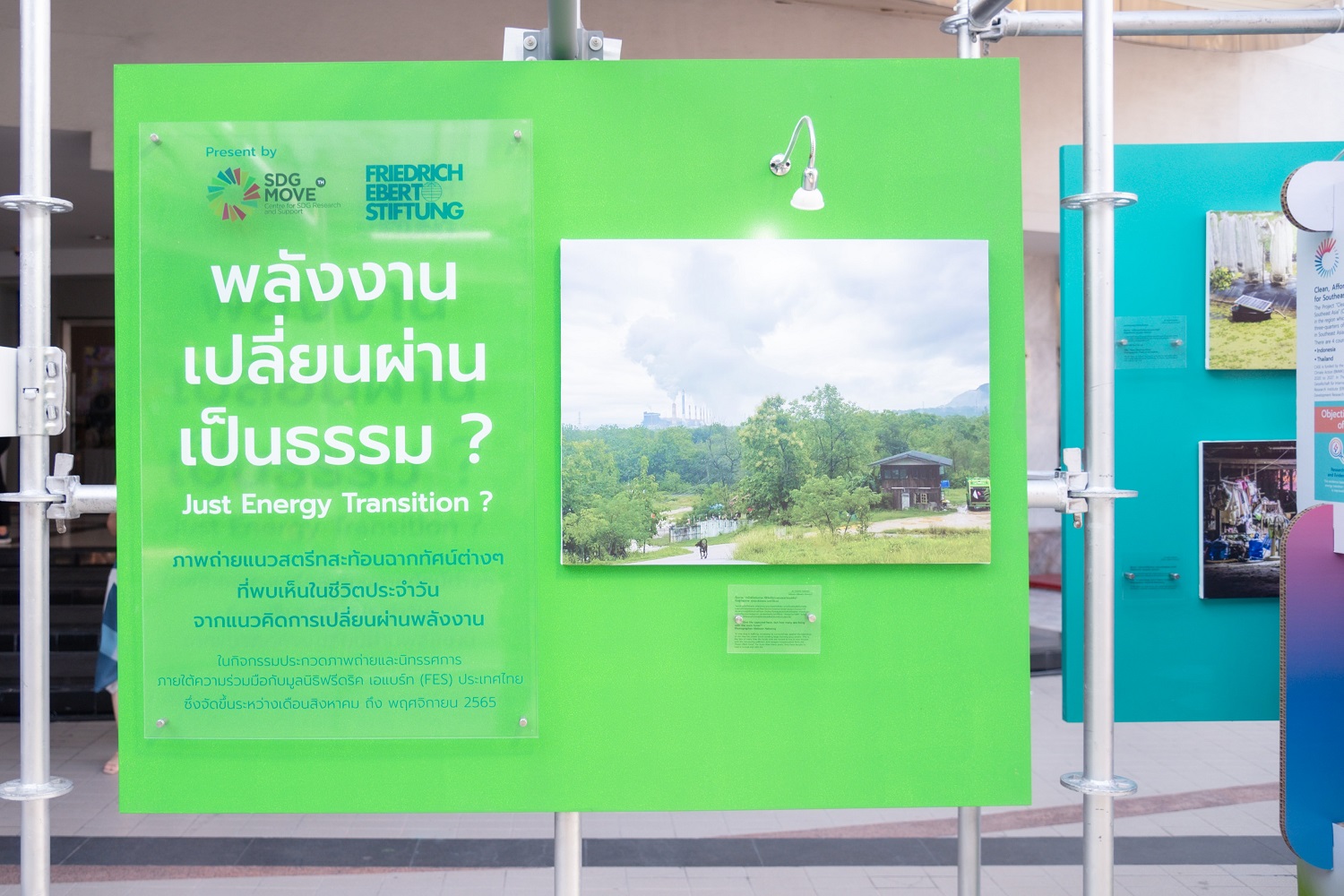GIZ’s CASE and partners join forces to encourage Thais to accelerate efforts towards energy transition
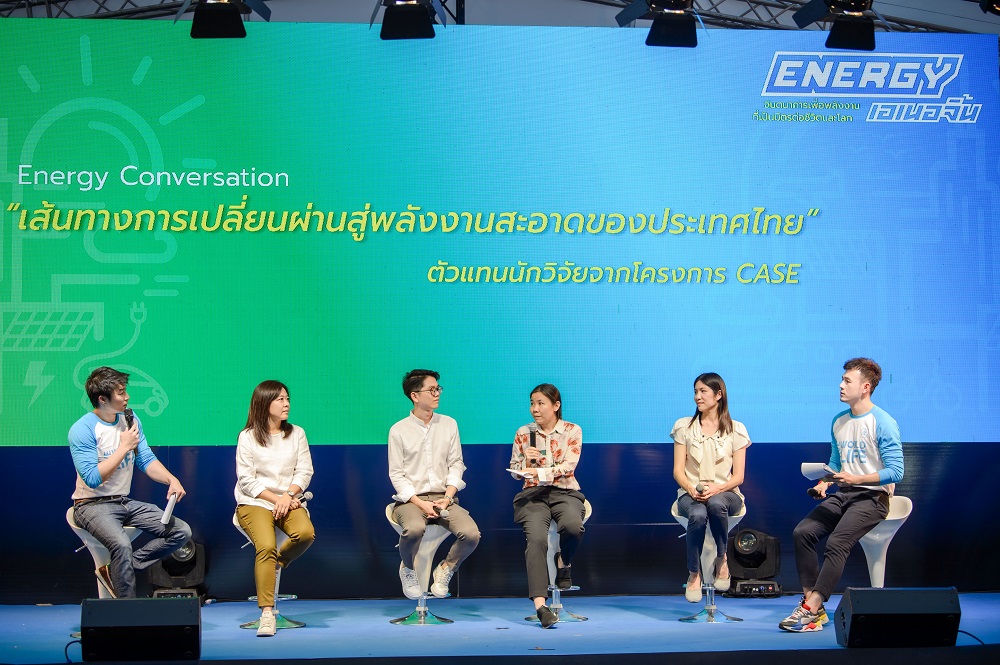
31 March 2023, Bangkok – Deutsche Gesellschaft für Internationale Zusammenarbeit (GIZ) GmbH, the Thailand Development Research Institute (TDRI), and the Energy Research Institute, Chulalongkorn University (ERI), who are among the partners implementing the Clean, Affordable, and Secure Energy for Southeast Asia (CASE) project, brought together a panel of experts to discuss “Thailand’s Transition Pathway to Clean Energy”. The discussion formed part of the “Energine: Jointly Imagine to Promote Sustainable Energy for Our Lives and the Planet” event held on 25 – 26 March 2023 at the Bangkok Art & Culture Centre.
The talk on “Thailand’s Transition Pathway to Clean Energy” aimed to build understanding and raise public awareness of the country’s transition towards clean energy in line with Thailand’s announcement of its goal to achieve carbon neutrality by 2050. Cooperation from all stakeholders, notably the power, environment, economy, civil, and political sectors, is required if this goal is to be achieved. Most essential of all is to ensure that Thai people understand and are aware of the importance of clean energy. In addition, the government must leverage its clean energy policy.
Dr. Wichsinee Wibulpolprasert, researcher from the Thailand Development Research Institute (TDRI)explained: “The Earth is getting warmer and warmer, and Thailand is one of the ten countries with extreme vulnerability to the effects of global warming. To mitigate this impact, Thailand must aim to reduce its emissions of carbon dioxide, to which the energy sector is the main contributor, as much as possible. Furthermore, Thailand must choose energy from clean sources. Nowadays, people have a better understanding of clean energy sources and are more alert to climate change. An increasing number of Thais are already installing solar panels and switching to electric vehicles (EVs). However, people’s demand for clean energy will not be fully met because Thailand’s electricity system still relies heavily on natural gas and coal. Therefore, policymakers must increase the proportion of clean energy in power generation while at the same time adjusting policies and measures to support the population in using electricity from clean energy sources.”
Dr. Siripha Junlakarn, researcher from the Energy Research Institute, Chulalongkorn University (ERI),expanded on solar power, saying: “Today, with the increasing number of business models relating to solar energy, the public has more options than ever before to have solar panels installed at an affordable price. There are many benefits for those who choose solar power for their homes, factories and offices, most notably the significant savings on their electricity bills. In Thailand, most people are still relying on electricity from the grid and their bills tend to be higher as a result of the current electricity price structure that might not keep up with the transformation trend. If this is left unchanged, energy inequality will increase and become a burden for many. However, the transition to solar or clean energy will need government action to ensure the stability of the electricity system by relying on such technologies as energy storage or batteries, as well as smart grids which are still very expensive and hard for people to access at the moment.”
Mr. Nuttawat Suwattanapongtada, Energy Advisor from Deutsche Gesellschaft für Internationale Zusammenarbeit (GIZ) GmbH proposed that government should promote and support investment in clean energy technology at the phase where it is not fully commercially feasible. “Such incentives from government will reduce the cost of related technologies, which will draw more investment from the private sectors in solar power and batteries. The cost of the technology will thus fall, and it will eventually be more accessible to the people. Government support to lower technology costs is essential, but it must go hand-in-hand with building public awareness of the importance and necessity of energy transition since the impact of non-transition will directly affect us all sooner or later. Using energy efficiently is a first step, but we also have to keep an eye on the National Energy Plan (NEP) being developed by the Ministry of Energy which will be publicized in the coming months in keeping the government vigilant and committed to the move towards appropriate direction. This also applies to the political parties that are running election campaigns.”
Dr. Tharinya Supasa, Project Lead Energy Policy Southeast Asia, Agora Energiewende, provided an insight into Germany’s successful transition to clean energy. “Every individual in Germany plays a strong role in monitoring governments and political parties, especially in energy transition. The efforts by civil society and indeed all sectors to push and encourage Germany to tackle global warming through legislation along with education have led to a clause being included in the Climate Change Act endorsed by Parliament that forces all sectors to comply with the legislation rather than doing so voluntarily. The mechanism for success here is that the people sent a strong signal and raised their voices until political parties recognised their needs. For their part, the political parties needed to have a common goal to make Germany a world leader in moving towards clean energy.”
The talk attracted the attention of the public, the private sector, civil society, and also representatives from political parties. Dr. Wichsinee closed the discussion by pointing out that the path to Thailand’s energy transition could be summarised in 4 words: “Open, Adjust, Change, Shout”.
“We must open our minds to the necessity of transitioning to clean energy, and remember that we have already made many energy transitions throughout history. This time, the move is towards a sustainable shift to clean energy. We need also to adjust our perception that this matter is not only the responsibility of government or any single entity. We all have a part to play as we all consume energy, so we are equally responsible for it as well. We need to change our energy policy to focus more on clean energy and we have to shout in order for our voices to be loud enough for political parties to recognize the issue and be motivated to make a clean energy future possible in reality, not only in our imagination.”
In addition to the discussion, “Energine: Jointly Imagine to Promote Sustainable Energy for Our Lives and the Planet” also organised a forum, inviting people and entrepreneurs to share ideas on fair energy transition. An exhibition “Jointly imagine…Energy transition in our generation” provided knowledge of climate issues, how the energy sector is the main cause of emissions as well as the pathway to achieving carbon neutrality in 2050 to which Thailand pledged at UN Climate Change Conference (COP26). Additionally, the event featured a photo exhibition themed “Just Energy Transition?” from a contest organised by SDG Move, in collaboration with Friedrich-Ebert-Stiftung (FES), a German foundation promoting freedom, solidarity, and justice. Finally, a storytelling gallery showcased key figures playing a role in energy transition and climate activists to inspire participants to take action.
For more information on CASE and its projects, please visit: https://www.facebook.com/CASEforSEA
About the Clean, Affordable, and Secure Energy for Southeast Asia (CASE)
The Clean, Affordable and Secure Energy for Southeast Asia (CASE) aims to support a narrative change in the SEA power sector towards an evidence-based energy transition in the pursuit of the Paris Agreement goals. CASE focuses on the four largest countries in the region: Indonesia, Vietnam, Thailand, and the Philippines.
These four countries represent nearly three-quarters of the total power generation in the region and account for about 72% of the region’s GDP and 82% of its population. Their energy development will largely impact the region’s ability to achieve its development and sustainability goals, as well as the Paris Agreement’s objective. CASE focuses on offering evidence-based solutions to the policymakers who are facing challenges and on building social support for the region. To do so, a joint fact-finding approach is applied to reduce areas of disagreement through expert analysis and discussion. The project also supports coordination in the SEA power sector by providing technical and policy support and facilitating discourse on energy visions.
GALLERY
Mr. Sascha Oppowa
CASE Project Director
Email:sascha.oppowa(at)giz.de
Related project news

